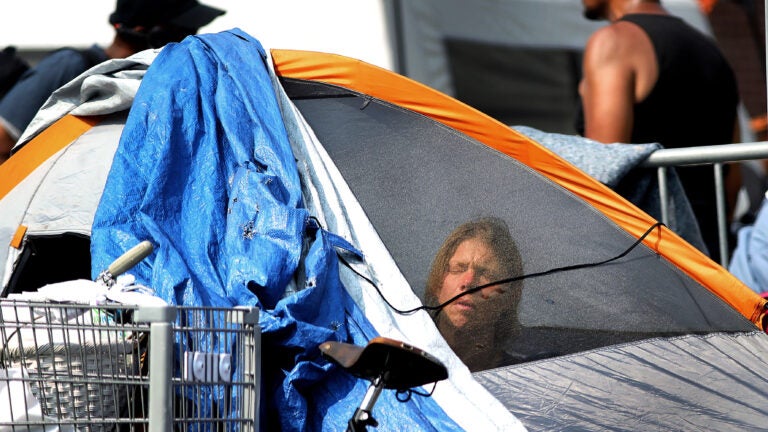Local News
Mayor Michelle Wu introduced a plan to clear encampments around Mass. and Cass in August. City Council is nearing a deadline to vote on it.

Almost two months after announcing a major plan to clear temporary shelters around the area of Mass. and Cass, Boston Mayor Michelle Wu is still waiting on City Council to take official action.
Wu filed an ordinance on Aug. 28 responding to what she said was an alarming uptick in public safety incidents at Mass. and Cass over the summer. It would empower Boston police officers to take down tarps and tents at the troubled area quicker, with the goal of restoring Atkinson Street to a functioning roadway while connecting those that live there with services and shelter.
The ordinance would automatically go into effect if no action is taken by City Council within a 60-day period. With that window nearing its end, councilors only have one meeting left, scheduled for next week, to vote on the plan.
It was initially on the agenda for this week’s meeting following a working session that lasted more than 7 hours Monday. But Councilor Ricardo Arroyo, who chairs the government operations committee, missed this week’s meeting after coming down with COVID-19, The Boston Herald reported. Arroyo told his colleagues Tuesday that he will bring the ordinance out for a vote next week.
Wu, who called for councilors to take swift action when she introduced the plan, said Wednesday that she was not happy to see a vote get pushed back again.
“It’s disappointing to see such an urgent issue that everyone across the board is hoping to see action on, that the authorization piece has been delayed again,” Wu said on WBUR’s “Radio Boston” program.
There is added pressure on officials this week to take action following reports that a 2-year-old spent a cold night around Mass. and Cass, where drugs and weapons could easily endanger a toddler. The child was found to be in good health, but police reported the incident to the Department of Children and Families. Council President Ed Flynn requested that the Boston Public Health Commission open an investigation into the matter.
“This is a very visible reminder that the opiate crisis touches everyone,” Wu told WBUR’s Tiziana Dearing in response to the news.
Complicating matters further is the dire state of the Massachusetts emergency shelter system. In the months since Gov. Maura Healey declared a state of emergency, she has been pressuring federal officials to provide additional funding and speed up the work authorization process for new arrivals. Healey called up National Guard members and contracted with hotels to expand housing and services, but a steady stream of families still continue to flood into the system.
Healey said Monday that the shelter system would reach capacity by the end of October, forcing officials to put a waitlist in place and prioritize those who are the most vulnerable. There is only enough space, service providers, and funds to accommodate about 7,500 families, she said. A total of 7,080 families were enrolled in the shelter system as of Thursday, according to state data, with 36 new families entering the system over a 24-hour period.
The Healey administration is taking action to help people get job training and exit the shelter system, but federal help is still greatly needed, the governor said. As people are shut out of shelter, many could end up at Mass. and Cass.
Wu’s ordinance would codify changes to the authority of Boston Police officers in removing temporary structures. Currently, officers are required to provide those living in these structures with notice 48 hours in advance of when their dwelling will be cleared.
“That 48-hour window has proven to be very difficult to practically implement,” she said on WBUR. “We need to keep going on the housing and treatment and services part of the infrastructure we’ve been building, but the public safety piece needs to be able to meet the immediacy of what’s happening on the ground.”
A series of violent incidents around Mass. and Cass jumpstarted another round of public discourse about how to improve the area this summer. In addition to clearing tents, Wu’s plan sought to add temporary shelter beds nearby and establish teams tasked with preventing other encampments from popping up around the city.
But encampments are already spreading, the Herald reported recently. Councilor Michael Flaherty told the paper that this is being driven by the dangerousness of Mass. and Cass.
When asked about these reports, Wu told Dearing that this is partly a product of the season, and that more tents and encampments typically get erected as the weather cools down in the fall. She also stressed that the ordinance would apply to the entire city, and that the teams of police and public health workers would effectively mitigate the issue.
Although Wu said she wished councilors took action sooner, her administration has been planning for the possibility of it taking this long. The initial announcement and filing of the ordinance was timed so that, even after the full window, it could be implemented before truly frigid temperatures hit Boston, she said.
“We would have preferred to be able to have more planning time with the ability to notify residents on the ground of what was happening with the maximum time available, but we were planning for this entire window just in case,” Wu told Dearing.
Newsletter Signup
Stay up to date on all the latest news from Boston.com